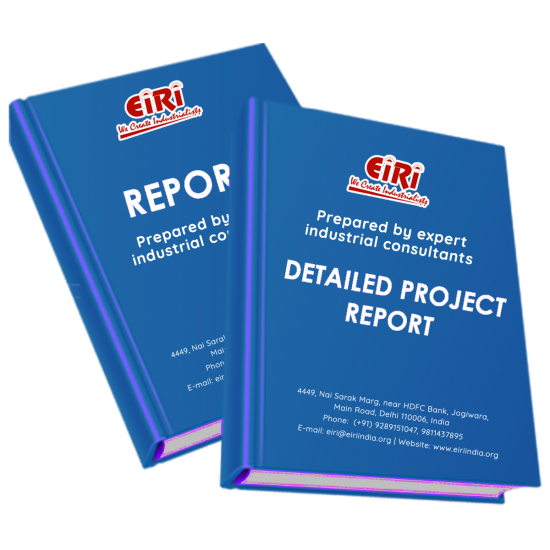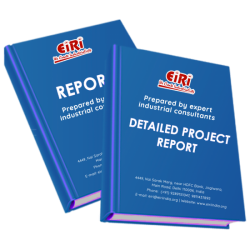Detailed Project Report on Di-Calcium Phosphate (Powder)

- More than 40 years of experience
- Managed by expert industrial consultants
- ISO 9001-2015 Certified
- Registered under MSME, UAM No: DL01E0012000
- 24/5 Research Support
Get your quesries resolved from an industry expert. Ask your queries before report or book purchase. - Custom Research Service
Speak to the our consultant to design an exclusive study to serve your research needs. - Quality Assurance
All reports are prepared by highly qualified consultants & verified by a panel of experts. - Information Security
Your personal & confidential information is safe & secure.
DI-CALCIUM PHOSPHATE (POWDER)
[EIRI/EDPR/4350] J.C.: 2535XL
Introduction
Dicalcium phosphate is also known as the calcium hydrogen phosphate dehydrate or dibasic calcium phosphate with the molecular formula CaHPO4. The ‘di’ prefix indicates the formation of the HPO42– anion, which involves the removal of two protons from phosphoric acid (H3PO4). Dicalcium phosphate is mostly used as a dietary supplement. It is commonly found as a dehydrate; however, it can be converted into an anhydrous form by applying heat. It is insoluble in water and biomaterial in nature. Dicalcium phosphate contains a minimum 19% of phosphorus content and maximum 28% of calcium content; therefore, it is used as a source of phosphorus and calcium.
Rock phosphates are natural sources of calcium phosphate in the form of tricalcium phosphate. Acidification of tricalcium phosphate with mineral acids yields phosphates and phosphoric acids. Acidification of rock salt with hydrochloric acid produces mono calcium phosphate which remains in solution which is treated to remove fluorides as precipitates.
The supernatant liquid containing monocalcium phosphate is treated with lime to obtain dicalcium phosphate and calcium chloride which is considered as a by-product. Phosphoric acids which are obtained on acidification of natural phosphates are purified and then neutralized to produce dicalcium phosphate.
Animal-feed grade Di-Calcium Phosphate is made from wet process acid that has been treated to reduce fluorine content to an acceptable level.
It is intended to prepare a Feasibility Report to install 600 MT/Year Di-Calcium Phosphate (Powder) production facilities as a Brown Field Project.
2. Uses /Applications
• Di-calcium phosphate is mainly used as a dietary supplement in prepared breakfast cereals, dog treats, enriched flour and noodle products.
• It is also used as a tableting agent in some pharmaceutical preparations, including some products meant to eliminate body odor.
• Di-calcium phosphate is also found in some dietary calcium supplements
• It is used in poultry feed.
• It is also used in some tooth pastes as a tartar control agent
• Heating dicalcium phosphate gives dicalcium diphosphate, a useful polishing agent
3. Market Overview
Dicalcium phosphate is of three types i.e., feed grade, fertilizer grade, and food grade. The feed grade is used for animals owing to provide proper fertility, growth, and bone development. Dicalcium phosphate helps in curing infertility caused due to lack of dietary minerals in order to reduce the inter-calving period. It helps to maintain calcium in the body, increases milk production, enhances fiber digestion, and improves resistance to prevent ruminal disorders and other diseases like mastitis. Dicalcium phosphate is used in various applications such as animal feed industry, fertilizer industry, and food industry. It is widely used in animal feed industry owing to various properties such as ease in feed digestibility and improves the nutritional quality.
The worldwide market for dicalcium phosphate is expected to register CAGR of around 4.1% over the next ten years and will be valued at US$980 Million in 2028. High cost of phosphorus owing to less availability is a factor challenging growth of the global market. Increasing findings in R&D for development of new product with high functionalities is a factor creating a lucrative opportunity for manufacturers operating in the global dicalcium phosphate market.
Growing industrialization, coupled with increasing animal feed, fertilizer, pharmaceutical, cosmetics, and other industries, rapid urbanization, coupled with high purchasing power, increasing consumption of processed and convenience food owing to hectic lifestyle, are factors proliferating demand for dicalcium phosphate. In addition, favorable regulation and statutes, increasing investments in various industries, and growing awareness among consumers for a healthy diet, have a positive impact on the global dicalcium phosphate market.
The market is segmented on the basis of geography such as North America, Europe, Asia-Pacific, Latin America, and Middle East and Africa. Rapid industrialization, coupled with growing various end-use industries such as food, fertilizer, and animal feed in countries such as China, India, Bangladesh, and others which in turn increase demand for dicalcium phosphate in the Asia Pacific region. Additionally, favorable government regulations, increasing consumer base, availability of raw material, and presence of major players are among some of the other factors driving demand for dicalcium phosphate. Increasing investments in various end-use industries, coupled with growing cosmetics and pharmaceutical industries in emerging countries such as Russia, Spain, Germany, France, and Italy has a positive impact on the dicalcium phosphate market in Europe. Increasing food and pharmaceutical industries in countries such as the US and Canada and high spending capacity are factors augmenting demand for dicalcium phosphate i
n the North America region.
Global Dicalcium Phosphate Market: Segmentation
The global dicalcium phosphate market can be segmented based on process, application, and region. In terms of process, the market can be bifurcated into phosphoric acid and hydrochloric acid. The phosphoric acid segment is projected to expand at a rapid pace during the forecast period. This process requires low capital investment and yields high purity product. This is estimated to increase the demand for dicalcium phosphate during the forecast period.
Based on application, the dicalcium phosphate market can be classified into animal feed, fertilizers, food & beverage, pharmaceuticals, cosmetics, and others. The fertilizers segment is projected to expand at a rapid pace during the forecast period. Rising demand for dicalcium phosphate-based fertilizers and continuous developments in the agriculture segment is projected to fuel the demand for dicalcium phosphate during the forecast period.
Dicalcium phosphate is mostly used as dietary supplements, especially to prepare breakfast cereals, dog treats, enriched flour, and noodle products due to its rich calcium and phosphate content. Increasing awareness related to health, rising consumption of dietary products, and growing population are expected to propel the market during the forecast period. Additionally, dicalcium phosphate is used as food additive; rapid expansion of the dairy & food industry and rise in meat consumption in emerging economies are projected to boost the demand for dicalcium phosphate during the forecast period.
Global Dicalcium Phosphate Market: Regional Outlook
In terms of region, the global dicalcium phosphate market can be divided into Asia Pacific, Europe, Latin America, North America, and Middle East & Africa. North America is expected to remain a leading region of the market during the forecast period. Growing awareness related to health and increasing demand for dietary products, and rising population are projected to drive the market in the region. Increasing usage of dicalcium phosphate in the manufacture of medicines and other health care products is estimated to drive the demand for this phosphate during the forecast period. The market in South Africa is anticipated to expand at a sluggish pace due to poor economy and lack of technological advancements in the country during the forecast period.
COST ESTIMATION
Plant Capacity 2 MT/Day
Land & Building (1450 sq.mt.) Rs. 1.45 Cr
Plant & Machinery Rs. 2.49 Cr
Working Capital for 1 Month Rs. 26.85 Lac
Total Capital Investment Rs. 4.46 Cr
Rate of Return 18%
Break Even Point 69%
CONTENTS
INTRODUCTION
USES/APPLICATIONS
MARKET OVERVIEW
GLOBAL DICALCIUM PHOSPHATE MARKET: REGIONAL OUTLOOK
GLOBAL DICALCIUM PHOSPHATE MARKET: KEY PLAYERS
PRODUCT SPECIFICATIONS
DICALCIUM PHOSPHATE
CALCIUM CHLORIDE
HYDROFLUORIC ACID
BIS SPECIFICATION
FORMULATION
REACTION – (A)
REACTION – (B)
RAW MATERIALS
ROCK PHOSPHATE
HYDROCHLORIC ACID (>30%)
PHYSICAL PROPERTIES
CALCIUM HYDROXIDE
RAW MATERIAL/CHEMICALS SUPPLIERS
ROCK PHOSPHATE
ACID
HYDRATED LIME
LABORATORY CHEMICALS
MANUFACTURING PROCESS STEPS/PROCESS FLOW/QUALITY CONTROL
PROCESS FLOW
QUALITY CONTROL
USE OF MACHINERY (CRITICAL)
GRINDING
BALL MILL
FEEDING SYSTEM
FILTRATION
ENGINEERING DESIGN CONSIDERATIONS
ETP FACILITY
ETP FLOW DIAGRAM (TYPICAL)
STP FLOW DIAGRAM (TYPICAL)
SEWAGE AND WASTE WATER EFFLUENT
UTILITIES REQUIREMENT (ESTIMATED - MONTH)
WASTE GENERATION & MANAGEMENT/GREEN BELT
GREEN BELT
WATER (ESTIMATED)
WASTE (ESTIMATED)
FLUE GAS (ESTIMATED)
PLANT & MACHINERY
SUPPLIERS OF PLANT & MACHINERY/TURNKEY SUPPLIERS
GRINDER
REACTORS
EVAPORATORS
MIXER
DRYER
STORAGE TANKS
CENTRIFUGE
PULVERIZERS
MATERIAL HANDLING EQUIPMENTS
BOILERS
INSTRUMENTATION AND PROCESS CONTROL EQUIPMENTS
D.G. SETS
EOT CRANES
POWER TRANSFORMERS
COOLING TOWER
ETP PLANTS
AIR POLLUTION CONTROL EQUIPMENTS
AIR CONDITIONING EQUIPMENTS
AIR COMPRESSOR
PLATEFORM WEIGHING MACHINE
ELECTRICAL MEASURING INSTRUMENTS
SUBMERSIBLE WATER PUMP
PRELIMINARY LAYOUT
PRINCIPLES OF PLANT LAYOUT
MAJOR PROVISIONS IN ROAD PLANNING FOR MULTIPURPOSE SERVICE ARE:
PLANT LOCATION FACTORS
PRIMARY FACTORS
RAW-MATERIAL SUPPLY:
MARKETS:
POWER AND FUEL SUPPLY:
WATER SUPPLY:
CLIMATE:
TRANSPORTATION:
WASTE DISPOSAL:
LABOR:
REGULATORY LAWS:
TAXES:
SITE CHARACTERISTICS:
COMMUNITY FACTORS:
HEALTH SAFETY AND ENVIRONMENT
ANTICIPATED ENVIRONMENTAL IMPACTS
CONSTRUCTION PHASE
OPERATION PHASE
MITIGATION MEASURES (PROPOSED)
HSE REQUIREMENT
SAFETY & OCCUPATIONAL MEASURE (STORAGE/HANDLING OF RAW MATERIAL & PRODUCT)
ENVIRONMENTAL/SAFETY LIABILITY AND ENVIRONMENT CLEARANCE PROCESS
PROPOSED IMPLEMENTATION SCHEDULE
PROJECT FINANCIALS
BASIS & PRESUMPTIONS (FOR PROFITABILITY WORKINGS)
APPENDIX – A:
01. PLANT ECONOMICS
02. LAND & BUILDING
03. PLANT AND MACHINERY
04. OTHER FIXED ASSESTS
05. FIXED CAPITAL
06. RAW MATERIAL
07. SALARY AND WAGES
08. UTILITIES AND OVERHEADS
09. TOTAL WORKING CAPITAL
10. TOTAL CAPITAL INVESTMENT
11. COST OF PRODUCTION
12. TURN OVER/ANNUM
13. BREAK EVEN POINT
14. RESOURCES FOR FINANCE
15. INSTALMENT PAYABLE IN 5 YEARS
16. DEPRECIATION CHART FOR 5 YEARS
17. PROFIT ANALYSIS FOR 5 YEARS
18. PROJECTED BALANCE SHEET FOR (5 YEARS)
How to Make Project Report?
Detailed Project Report (DPR) includes Present Market Position and Expected Future Demand, Technology, Manufacturing Process, Investment Opportunity, Plant Economics and Project Financials. comprehensive analysis from industry covering detailed reporting and evaluates the position of the industry by providing insights to the SWOT analysis of the industry.
Each report include Plant Capacity, requirement of Land & Building, Plant & Machinery, Flow Sheet Diagram, Raw Materials detail with suppliers list, Total Capital Investment along with detailed calculation on Rate of Return, Break-Even Analysis and Profitability Analysis. The report also provides a birds eye view of the global industry with details on projected market size and then progresses to evaluate the industry in detail.
We can prepare detailed project report on any industry as per your requirement.
We can also modify the project capacity and project cost as per your requirement. If you are planning to start a business, contact us today.
Detailed Project Report (DPR) gives you access to decisive data such as:
- Market growth drivers
- Factors limiting market growth
- Current market trends
- Market structure
- Key highlights
Overview of key market forces propelling and restraining market growth:
- Up-to-date analyses of market trends and technological improvements
- Pin-point analyses of market competition dynamics to offer you a competitive edge major competitors
- An array of graphics, BEP analysis of major industry segments
- Detailed analyses of industry trends
- A well-defined technological growth with an impact-analysis
- A clear understanding of the competitive landscape and key product segments
Need Customized Project Report?
- Ask for FREE project related details with our consultant/industry expert.
- Share your specific research requirements for customized project report.
- Request for due diligence and consumer centric studies.
- Still haven't found what you're looking for? Speak to our Custom Research Team
About Engineers India Research Institute:
Note: We can also prepare project report on any subject based on your requirement and country. If you need, we can modify the project capacity and project cost based on your requirement.
Our Clients

Our Approach
- Our research reports comprehensively cover Indian markets (can be modified as per your country), present investigation, standpoint and gauge for a time of five years*.
- The market conjectures are produced on the premise of optional research and are cross-accepted through associations with the business players
- We use dependable wellsprings of data and databases. What's more, data from such sources is handled by us and incorporated into the report
Why buy EIRI reports?
- Our project reports include detailed analysis that help to get industry Present Market Position and Expected Future Demand.
- Offer real analysis driving variables for the business and most recent business sector patterns in the business
- This report comprehends the present status of the business by clarifying a complete SWOT examination and investigation of the interest supply circumstance
- Report gives investigation and top to bottom money related correlation of real players/competitors
- The report gives gauges of key parameters which foresees the business execution























